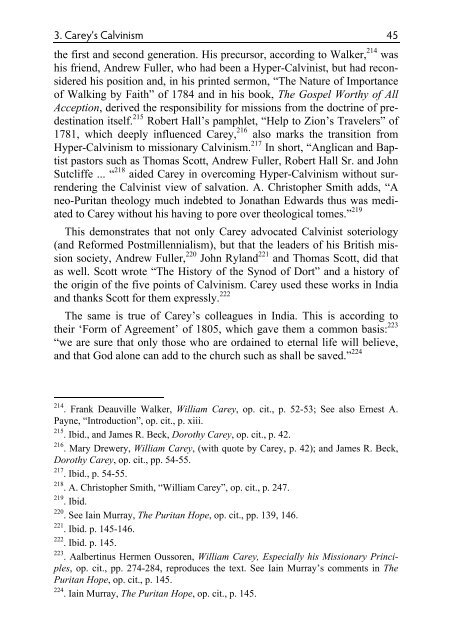William Careys Theology - World Evangelical Alliance
William Careys Theology - World Evangelical Alliance
William Careys Theology - World Evangelical Alliance
You also want an ePaper? Increase the reach of your titles
YUMPU automatically turns print PDFs into web optimized ePapers that Google loves.
3. Carey’s Calvinism 45<br />
the first and second generation. His precursor, according to Walker, 214 was<br />
his friend, Andrew Fuller, who had been a Hyper-Calvinist, but had reconsidered<br />
his position and, in his printed sermon, “The Nature of Importance<br />
of Walking by Faith” of 1784 and in his book, The Gospel Worthy of All<br />
Acception, derived the responsibility for missions from the doctrine of predestination<br />
itself. 215 Robert Hall’s pamphlet, “Help to Zion’s Travelers” of<br />
1781, which deeply influenced Carey, 216 also marks the transition from<br />
Hyper-Calvinism to missionary Calvinism. 217 In short, “Anglican and Baptist<br />
pastors such as Thomas Scott, Andrew Fuller, Robert Hall Sr. and John<br />
Sutcliffe ... “ 218 aided Carey in overcoming Hyper-Calvinism without surrendering<br />
the Calvinist view of salvation. A. Christopher Smith adds, “A<br />
neo-Puritan theology much indebted to Jonathan Edwards thus was mediated<br />
to Carey without his having to pore over theological tomes.” 219<br />
This demonstrates that not only Carey advocated Calvinist soteriology<br />
(and Reformed Postmillennialism), but that the leaders of his British mission<br />
society, Andrew Fuller, 220 John Ryland 221 and Thomas Scott, did that<br />
as well. Scott wrote “The History of the Synod of Dort” and a history of<br />
the origin of the five points of Calvinism. Carey used these works in India<br />
and thanks Scott for them expressly. 222<br />
The same is true of Carey’s colleagues in India. This is according to<br />
their ‘Form of Agreement’ of 1805, which gave them a common basis: 223<br />
“we are sure that only those who are ordained to eternal life will believe,<br />
and that God alone can add to the church such as shall be saved.” 224<br />
214 . Frank Deauville Walker, <strong>William</strong> Carey, op. cit., p. 52-53; See also Ernest A.<br />
Payne, “Introduction”, op. cit., p. xiii.<br />
215 . Ibid., and James R. Beck, Dorothy Carey, op. cit., p. 42.<br />
216 . Mary Drewery, <strong>William</strong> Carey, (with quote by Carey, p. 42); and James R. Beck,<br />
Dorothy Carey, op. cit., pp. 54-55.<br />
217 . Ibid., p. 54-55.<br />
218 . A. Christopher Smith, “<strong>William</strong> Carey”, op. cit., p. 247.<br />
219 . Ibid.<br />
220 . See Iain Murray, The Puritan Hope, op. cit., pp. 139, 146.<br />
221 . Ibid. p. 145-146.<br />
222 . Ibid. p. 145.<br />
223 . Aalbertinus Hermen Oussoren, <strong>William</strong> Carey, Especially his Missionary Principles,<br />
op. cit., pp. 274-284, reproduces the text. See Iain Murray’s comments in The<br />
Puritan Hope, op. cit., p. 145.<br />
224 . Iain Murray, The Puritan Hope, op. cit., p. 145.
















